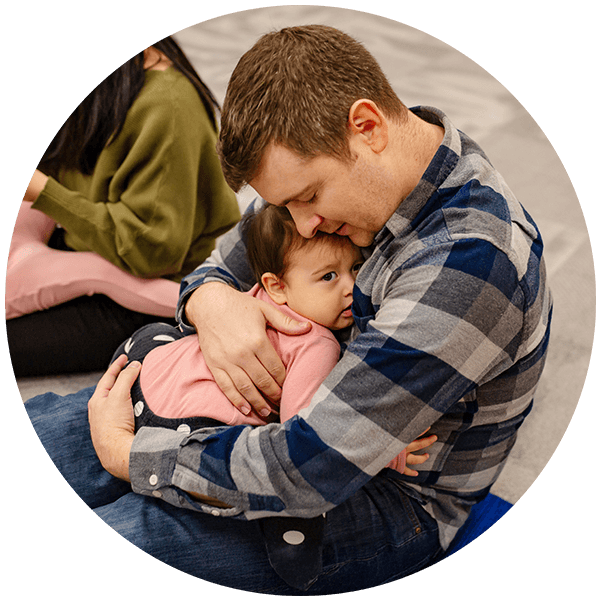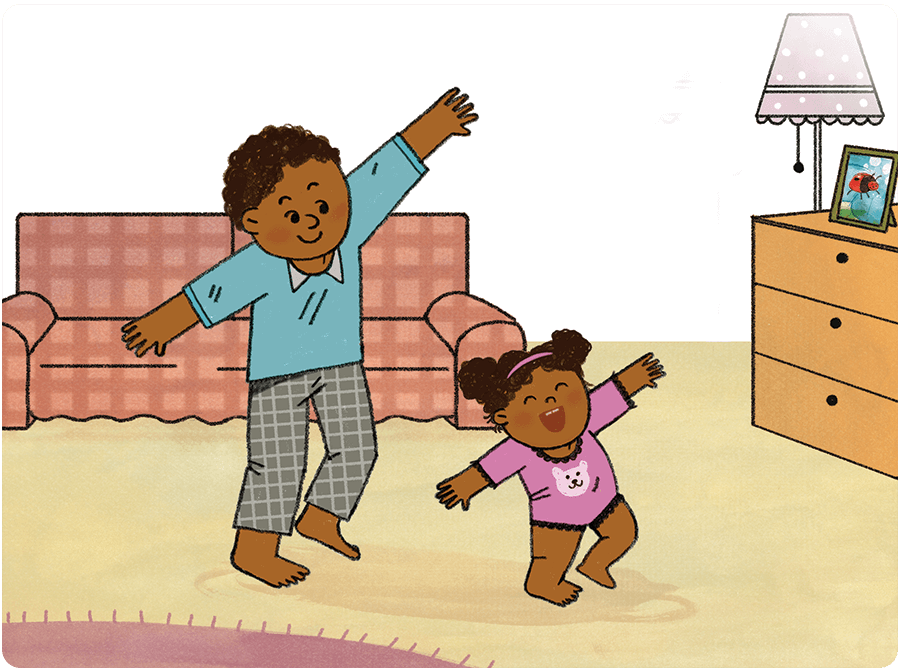In our most recent blog post, we talked about how making music with your child can help you get through some of those rough times when your children don’t seem to want to drink their milk, wash their face, or put on their shoes. Now we are going to do a little bit of a deeper dive into what happens in the brain when people make music, and why musical parenting might be helpful.

Soothing
Music can soothe and relax us. In your Music Together® classes, when you get to the lullaby at the end of class, yes, some children have trouble winding down and are still wandering around the room, but many children allow their caregivers to snuggle and calm them. Sometimes this can take some time (those kids who are wandering around might just need a bit longer to relax) but by-and-large children and adults(!) are soothed by music.
How? It turns out that making music can release endorphins (those feel-good chemicals), dopamine (the area that stimulates the reward system in the brain), and can regulate cortisol levels (stress). And how much differently might we—both children and adults—react to things when we are a bit more regulated and soothed! Singing any song gently and slowly to your child can help with that, no matter the activity.
Bonding
When more than one person makes music in a group, they naturally connect with each other. Their heartrates sync up and their brains experience similar activity (demonstrated in some of our earlier posts.) Plus, music-makers connect by working toward a shared goal: singing a song, dancing, or rhythmically chanting through an activity.
Have you noticed that feeling of connection and community in class? The same is true of making music at home with your family. At times when parenting seems particularly frustrating, it might be helpful to explore connecting with your child through singing or dancing with them.
Positive Social Interactions
It’s now thought that all of these factors—the similar brain activity, the breath and heartrate synchronicity—might support the ability for young children to engage in positive social interactions. And it even applies to infants! As infants and children grow and begin to make their way out in the world, they will have practiced interacting with others through singing with their caregivers as well as the other adults and children in their classes. Singing and dancing together with others is a positive interaction. Outside of class, making music with your children during a tough time can open the door to a more positive interaction between you and your child. Even when you are trying to get them to put on their socks.
Flexible Thinking
When you start singing, your child’s attention can shift from what they are doing (maybe not cooperating too much), to what you are singing about (what you would like them to do). By shifting your child’s attention through music, you are allowing them to practice the skill of flexible thinking. (For more info on this topic, check out our interview with Music Together Coauthor Dr. Lili M. Levinowitz, “How Does Music-making Support Executive Function?”)
Having the ability to shift gears and go in another direction, or go along with a new idea, can lead to more familial harmony and greater success in school and work environments. This cognitive flexibility takes time and practice to hone (in fact, many adults are still practicing it!) and, again, music can help! As you move from one song to the next in your music class, you are already supporting the development of cognitive flexibility. At home, the same skill is practiced when you sing to change the activity your child is engaged in. Shifting their attention (and yours) from a tough moment to a song about that tough moment, is just another example of musical parenting.
Now, we all know there is no one solution that will magically make all your days tantrum-free. But isn’t it great to know that music gives you new ideas for when parenting gets a bit challenging?

Singing and dancing with your child is a blast all on its own—and it might just help you get through the day with a little more levity and love. And think of all of the memories you can build by adding music to your parenting toolbox.
For all of these reasons and more, try using the songs you sing in your Music Together class, the songs you grew up hearing, or your favorite pop songs, to share music with your child, even in those moments of frustration and stress. Try a bit of musical parenting…and let us know how it goes!



